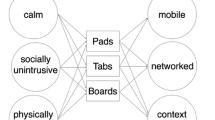Abstract
The chance encounter with a colleague in the corridor; the discussion around a table or whiteboard in a meeting room; the interactions over sketches on table napkins in a restaurant: those are all examples of spontaneity in the absence of electronic devices. In ubiquitous computing, where there are “hundreds of computers per room” [7]; personal devices carried or worn by the humans; and computational services associated even with non-electronic entities 3/4 people places and things [4] 3/4 the opportunities for spontaneous sharing of ideas and media should multiply [3,5]. In this talk I shall take spontaneity, like mobility, to be a basic human desideratum. While some might prefer the routine, in general we stand to benefit from the serendipitous availability of other people and computational resources as we move around in our everyday lives.
At first sight, there is room for optimism about realising that vision. For example, cash machines are a reasonably successful example of the design of “walk up and use” devices: in a foreign city, we happen upon one and successfully withdraw cash with little chance of error. But spontaneity in ubiquitous computing is far more challenging. First, it encompasses multi-device, multi-human interaction. For example, one user shows the other a document from their mobile personal server [6] on a convenient nearby screen; a group of friends play their media to one another using whatever devices there are between them in a bedroom or living-room [1]. Second, the invisibility of wireless associations can be as much of a hindrance as an aid to spontaneity [2].
I will examine the opportunities and the challenges for spontaneous interaction, using case studies to make a progress report for the research community.
Access this chapter
Tax calculation will be finalised at checkout
Purchases are for personal use only
Similar content being viewed by others
References
Barton, J., Goddi, P., Spasojevic, M.: Creating and Experiencing Ubimedia. HP Labs tech. report HPL-2003-38
Keith Edwards, W., Grinter, R.E.: At Home with Ubiquitous Computing: Seven Challenges. In: Abowd, G.D., Brumitt, B., Shafer, S. (eds.) UbiComp 2001. LNCS, vol. 2201, pp. 256–272. Springer, Heidelberg (2001)
Kindberg, T., Fox, A.: System Software for Ubiquitous Computing. IEEE Pervasive Computing 1(1), 70–81 (2002)
Kindberg, T., et al.: People, Places, Things: Web Presence for the Real World. Mobile Networks and Applications 7(5), 365–376 (2002)
Supporting Spontaneous Interaction in Ubiquitous Computing Settings. Workshop at Ubicomp (2002), http://www.dcs.gla.ac.uk/~pd/Workshops/spontaneity02.html
Want, R., et al.: The Personal Server: Changing the Way We Think about Ubiquitous Computing. In: Borriello, G., Holmquist, L.E. (eds.) UbiComp 2002. LNCS, vol. 2498, pp. 194–209. Springer, Heidelberg (2002)
Weiser, M.: The Computer for the 21st Century. Scientific American 265(3), 94–104 (1991)
Author information
Authors and Affiliations
Editor information
Editors and Affiliations
Rights and permissions
Copyright information
© 2003 Springer-Verlag Berlin Heidelberg
About this paper
Cite this paper
Kindberg, T. (2003). The Zen of Everyday Encounters: Spontaneous Interaction in Ubiquitous Systems. In: Chittaro, L. (eds) Human-Computer Interaction with Mobile Devices and Services. Mobile HCI 2003. Lecture Notes in Computer Science, vol 2795. Springer, Berlin, Heidelberg. https://doi.org/10.1007/978-3-540-45233-1_2
Download citation
DOI: https://doi.org/10.1007/978-3-540-45233-1_2
Publisher Name: Springer, Berlin, Heidelberg
Print ISBN: 978-3-540-40821-5
Online ISBN: 978-3-540-45233-1
eBook Packages: Springer Book Archive




